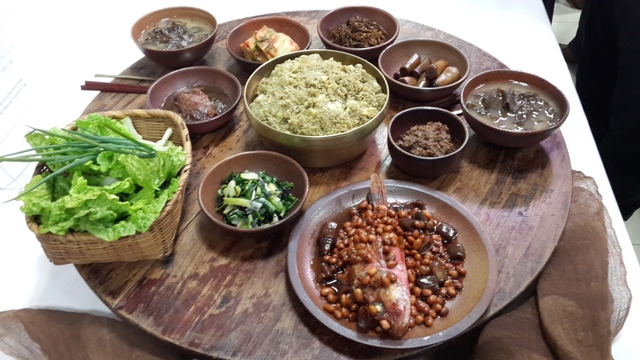| |
 |
|
| ▲ A spread of traditional Jeju food. Photo by Anne Hilty |
A culture is known through its foods.
Across the globe, researchers and writers have studied cultures by what their foods tell us. Simple foods: limited resources, poverty, hardworking individuals too busy for extensive preparation, or a valuing of simplicity for health or religious reasons. Elaborate cuisine: wealth, prominence, abundant resources, group (or servant) preparation, cultural hospitality codes. And much more.
And what do the traditional dishes of Jeju haenyeo tell us?
A celebration of "Haenyeo Storytelling through Food" took place at Jeju Welcome Center on Saturday, January 23rd. Its organizational team was led by Jeju Senator Lee Sunhwa, champion of the haenyeo cause, and the event was very well attended by media and public alike.
Opening with a performance by the Hado Marine Collective Haenyeo Choir, conducted by Im Paekyeon, the ceremony included welcoming speeches by both Senator Lee and Bang Ki-sung, Jeju Vice Governor of Administrative Affairs. National Assembly member and haenyeo supporter Gil Jungwoo presented on the significance of UNESCO designation for haenyeo culture, while Professor Shin Jaegyung of Seibi University (Fukuoka, Japan) spoke of haenyeo as "mothers to us all."
This was followed by a narrated display and tasting opportunity of iconic haenyeo foods. The event was prepared and provided by Jeju National University Department of Storytelling, which is chaired by Professor Yang Jin-gun and in which Senator Lee, a former production director of MBC, currently studies. Kim Jisoon, a local foods expert, created the highly artistic display of foods.
| |
 |
|
| ▲ Senator Lee Sunhwa. Photo by Anne Hilty |
Significant traditional dishes of the Jeju haenyeo include abalone, topshell, sea cucumber, sea snail, seaweeds, crab, and sea urchin, all supplemented by a variety of vegetables grown in the fields. These stalwart divers, risking their lives time and again by going repeatedly into the sea, work equally in the hardscrabble volcanic fields and fierce winds that define this island culture.
Abalone ("jeonbok"), has long been known for its medicinal properties. This was also historically a source of lucrative yield for Jeju haenyeo and the island's economy -- and was required as tribute by the royal court of the Joseon era. High in nutritive value, it is often made into a porridge which renders it easily digestible -- especially good for children, elderly, and the ill.
The abalone, according to materials provided for the event, can be viewed as a metaphor for the hardship of haenyeo life. Difficult to find in the darkest depths, clinging fiercely to rock, requiring special tools and great effort to harvest, the highly prized abalone reveals the difficult nature of haenyeo work.
The salty topshell ("sora") and sea cucumber ("haesam toryeom"), commonly referred to as "the ginseng of the sea," have always been plentiful in Jeju waters. A source of energy according to local lore, they are comparatively easy to harvest and as such have long represented one of the mainstays of the Jeju haenyeo diet.
Jeju Island, with its hardships represented by volcanic soil, strong winds and waves, frequent droughts, periodic typhoons, and isolation from the mainland, was historically a place of poverty. People lived simply, and food was frequently scarce. This combination of elements prohibited all but subsistence farming -- but the sea, though dangerous, always provided sustenance.
| |
 |
|
| ▲ A haenyeo choir. Photo by Anne Hilty |
In early spring, when winter stores were depleted and not even the earliest agricultural products could be harvested, when the shellfish reseeding and winter waters had precluded diving for some time, food was at its scarcest. At this time of year, it was dishes of haenyeo-harvested seaweed (teop-bap) and sweet potatoes (goguma-bap) that sustained the island's people.
Another of Jeju's more abundant shellfish is the sea snail ("bomal"). One of the fleshier of mollusks, it provides a goodly amount of protein and as a result has been referred to by Jeju people as the "meat of the sea." It too is often made into a highly digestible porridge.
A local favorite is the crab porridge, made with small crustaceans ("kangi") found along the shore. The size of the crab requires delicate work to extract and many to make a meal, and is thus referred to as "love from a mother's hands." The slow cooking method of the rice-based porridge is suitable for many a dish of busy women.
Sea urchin soup ("seongge guk") was and still is a delicacy served primarily at celebratory events. The delicate purple urchin found in these waters, hauled in by the net-full during its brief season in late spring, yielded a high price due to its unwieldy nature and difficult processing, and was thus reserved for special occasions and otherwise sold. Today it is less abundant, scarcity keeping its price high. Served with seaweed in an anchovy stock, it is a dish entirely reminiscent of the sea itself.
Haenyeo rituals to the sea gods were not left out of this ceremony. The annual ritual to Yeongdeung, goddess of sea and wind, has already been declared by UNESCO as World Intangible Cultural Heritage; falling 2.1-15 on the lunar calendar, it will take place in approximately one month's time. A month later, the annual Divers' Ritual ("jamsu-gut") to the dragon king and queen of the sea will be held in coastal villages throughout the island. Meant to placate the gods and ensure safety and prosperity for the season, no doubt the prayers this year will include an entreaty for a successful UNESCO bid.
The Haenyeo Storytelling through Food event, sponsored by Jeju Government and meant to contribute to the quest for UNESCO designation of Jeju Haenyeo, was by all accounts an enormous success.
--
Dr. Hilty is a cultural health psychologist from New York currently living on Jeju Island. |






















